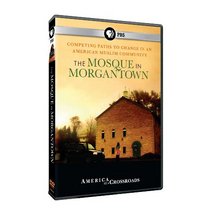| Actor: Asra Nomani Director: Brittany Huckabee Genres: Television, Documentary Sub-Genres: Television, Documentary Studio: Pbs (Direct) Format: DVD DVD Release Date: 07/14/2009 Release Year: 2009 Run Time: 1hr 16min Number of Discs: 1 SwapaDVD Credits: 1 Total Copies: 0 Members Wishing: 0 MPAA Rating: Unrated |
Search - America at a Crossroads: The Mosque in Morgantown on DVD
  | America at a Crossroads The Mosque in Morgantown Actor: Asra Nomani Director: Brittany Huckabee Genres: Television, Documentary UR 2009 1hr 16min Studio: Pbs Release Date: 08/18/2009 Run time: 76 minutes |
Larger Image |
Movie DetailsSimilar Movies
|
Movie ReviewsFair and balanced Texas Reader | Texas | 10/16/2009 (4 out of 5 stars) "I saw Mosque in Morgantown on PBS. It's basically about how Asra Nomani is fighting for women to pray beside men at a mosque located in Morgantown, West Virginia. What I like about the documentary is the fact that there is no narrator. It lets the people tell the story and give their point of view. It allows the viewer to make their own decision as to how they should feel. Also, the documentary is very fair towards the Muslim population in Morgantown. It winds up showing that this is not a fight against extremists or moderates, but a battle between people who have different interpretations of the Qur'an. In fact, that is a battle fought in churches and synagogues around the world. Overall, it is enjoyable to watch and very informative. " One Masjid Divided Jeffery Mingo | Homewood, IL USA | 07/15/2009 (3 out of 5 stars) "This documentary is about an INTRAcommunal matter: this is not Muslim vs. Christian. It is about Muslims disputing gender equality at a particular mosque. Also, important is the format. This work has no narrator. Aside from quick sentences flashed on the screen, the entire work is based upon interviewees who are key players. Some may find the format a bit dull. Others will say it allows viewers to come to their own conclusions.
Due to the format, many factors are left off the table. The dispute takes place at a mosque in a university town in West Virginia. As far as I know, West Virginia is not as racially diverse as many states in the country. It is the second poorest state in the nation. It may be a solid red state in this purple America, so the frame of this debate is a bit absent. However, the mosque members sometimes do ask, "What will THEY think of US!?" One mosque has an internal schism, and the entire national and international press pays attention to it. I am worry that the press' and viewers' focus here may be based upon schadenfreude (sp?). Many churches in Middle America have tensions. I worry that those who don't support religious diversity will like this work for sinister reasons. The division presented here was between conservative vs. moderate Muslims. You almost never hear the word "progressive" here. (Some say tensions among Cuban Americans are framed by these two labels as well.) I wonder if European viewers would be bored. Many European nations have much larger Muslim populations than the US does. Things that seem novel to us may be old-hat to them. Think about the difference in the US' and France's admiration of Josephine Baker and reverse it. Originally I had heard that most Muslims place their religious identities above all other identities. This work shows the seams of that. One South Asian parishioner said the Arab Muslims were more conservative. Another parishioner said those who live in West Virginia permanently should have a stronger voice than visiting students and scholars. Any women's studies major may want to see this as women's rights is the huge dividing line here. I would say that people who have practiced a religion for generations would be deemed more authentic than new converts. This work shows a convert of majority ethnicity who is treated as belonging just as much as the long-time Muslims. This surprised me: I would imagine that long-term folk in any place of worship would demand that newbies take a back seat. This work was 75 minutes, rather than 90. Honestly, it could have been completed in 60 minutes if the documentary makers wanted to economize." |


